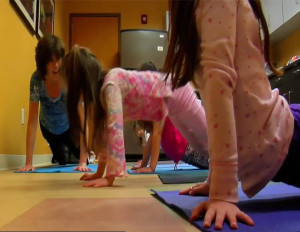A 17 year old so stressed by college applications and SATs that she isn’t eating and has lost ten pounds this month. A 15 year old increasingly distracted and irritable because he is falling further and further behind in math and gets home at 10pm each night after soccer practice. A 13 year old consumed by the social pressures in 8th grade and what her friends are posting online keeping her tossing and turning until 1 AM. Sadly, these are only some of the kids I’ve seen in my practice this month deeply affected by feelings of overwhelming stress in their lives. As a doctor and as a parent, I want nothing more than to reduce the pressure they are experiencing. Yet I have come to realize that the most helpful thing I can teach them is not avoidance but ways to better cope with stress.
There are many potentially effective practices to build stress-coping competency. The Center for Contemplative Mind in Society has developed a wonderful graphic depicting a Tree of Contemplative Practices to consider, ranging from more active and creative to more restive and reflective. The best of these actively engage teens and can become life-long self-care skills. At the Whole Child Center, we’ve found an integrative approach combining lifestyle counseling (including discussion about nutrition, fitness and sleep/rest) with mind-body skill coaching (typically yoga and meditation) to be ideal. Research is beginning to support our observations. One recent study found that, compared to a control group of “PE-as-usual” students, teens participating in a yoga program of physical postures, breathing exercises, relaxation, and meditation 2 to 3 times a week for 10 weeks reported improved mood and reduced anxiety. With rising numbers of adolescents being prescribed psychoactive medications and reporting significant adverse effects and questionable efficacy, it is crucial we continue to examine holistic programs that create optimal health in mind, body and spirit. Yes, these innovative integrative solutions take time and financial resources to implement, but I would argue the they are quite cost-effective in comparison to the price we are paying for the deterioration of our children’s mental and physical health.
(Originally written for the Deirdre Imus Environmental Health Center)

Leave a Reply
You must be logged in to post a comment.